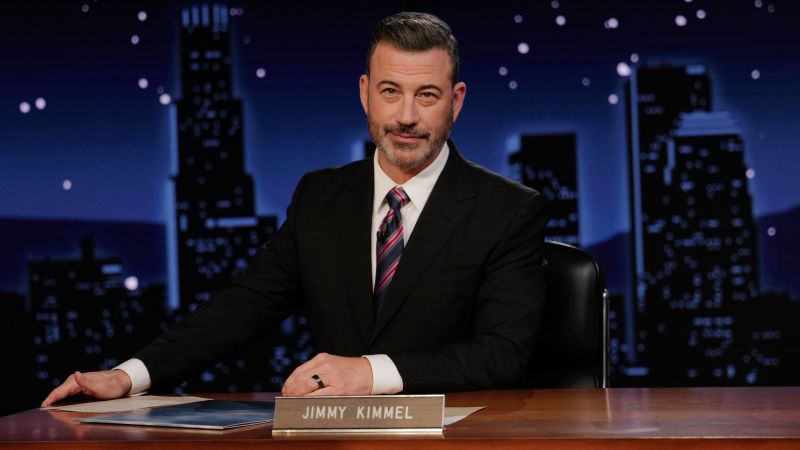The Jimmy Kimmel tug-of-war was about free speech, yes, but it was also about the free market.
This week’s restoration of Kimmel’s show was partly the result of consumer pushback to the late-night show’s preemption.
Feedback from angry viewers, wary advertisers, and frustrated employees all weighed on the executives who ultimately brought the show back on the air despite President Trump’s menacing remarks about Kimmel.
The week-long drama is proof that consumers “have extraordinary power,” former labor secretary Robert Reich wrote in an essay.
“When our outrage translates into withholding our consumer dollars, a big corporation like Disney is forced to listen — and respond,” Reich wrote, urging readers to “remember this” for next time.
Owners of local TV stations also felt the pressure. Employees at some stations reported being inundated with phone calls from irritated Kimmel fans.
Even after Disney reinstated Kimmel’s show on Tuesday, two local TV giants refused to air the show on dozens of ABC-affiliated stations. But both companies, Sinclair and Nexstar, folded on Friday without anything obvious to show for it.
The highly unusual blackout highlighted longstanding tensions between local affiliates and national networks — as well as the limited power of the affiliates.
The relationship is governed by legal contracts known as affiliate agreements. While local owners can choose to preempt some national programming, those “right to reject” instances are usually one-offs, not related to a politically charged protest.
A lengthy preemption of a show like “Jimmy Kimmel Live!” would have left Disney examining its legal options and seeking other affiliate partners in the affected local markets.
Disney’s upper hand
But Disney held most of the cards in this dispute, despite the Trump administration’s TV regulator Brendan Carr’s public support for Nexstar and Sinclair.
Carr propelled the Kimmel controversy on Sept. 17 by condemning the comedian’s remarks in the wake of Charlie Kirk’s assassination. Carr also threatened Disney, which raised eyebrows given that companies like Nexstar need his approval to acquire more stations. When Nexstar and Sinclair said they would preempt Kimmel’s show, Carr praised them, claiming the station owners were being “responsive to the needs and values of the local communities you serve.”
The ensuing backlash spurred free speech protests not just outside Disney’s offices, but also at some of the stations owned by Nexstar and Sinclair.
Outside WTNH, the ABC affiliate in Bridgeport, Connecticut, a protester told a rival station, WVIT, that the blackout was a wake-up call about media ownership: “I had no idea before all this happened. In fact, I was like, who is Nexstar? So, it’s a lesson for all of us.”
It was also a lesson in local TV economics. Stations need to attract viewers; otherwise, the stations can’t sell ad time to local businesses or charge retransmission fees to distributors.
Although Trump says Kimmel has “bad ratings,” Kimmel has been holding his own in a shrinking late-night TV landscape, and any hastily arranged alternative programming in Kimmel’s time slot likely resulted in lower ratings for Sinclair and Nexstar’s stations.
Lower ratings usually translate to less ad revenue for local stations.
In some of the cities where Kimmel was blacked out by Sinclair and Nexstar, activists pressured advertisers to stop buying airtime on the ABC affiliates.
Boycott lists circulated on sites like Reddit. Allen Goldstein, who organized a campaign against KOMO, the Sinclair-owned station in Seattle, wrote on Facebook that “Sinclair is cozying up to the newly weaponized FCC by restricting free speech, obfuscating the truth, and promoting a fascist agenda.”
Both Sinclair and Nexstar asserted that they were not influenced by Carr’s public comments against Kimmel.
Journalists at some Nexstar and Sinclair stations were perturbed during the blackout because they felt like pawns in a political battle. Reporters and producers had to make longer newscasts to fill the late-night time — while ignoring the Kimmel news and dodging complaints from viewers.
In a statement, Sinclair also alluded to the backlash that followed the Kimmel blackout, saying it received “thoughtful feedback from viewers, advertisers, and community leaders representing a wide range of perspectives.”
Critics of Trump’s ongoing campaign to expand presidential power — for instance, by jawboning media companies into changing late-night TV content — pointed to the Kimmel episode as a clear illustration of consumer power.
“We saw the power of the people over the last few days, and it spoke volumes, and it moved a decision in the right direction,” Kamala Harris said after Disney reinstated Kimmel.

